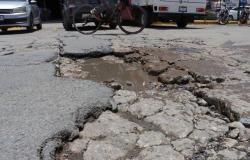He General Irrigation Department ended a key stage in the dispute over access to water in what many consider the “promised land” of agricultural and tourist developments. The right bank of the Mendoza Riverthat enormous strip that includes a large part of Luján and a portion of the Uco Valley is an area with little surface water infrastructure and since 1998 it has restrictions on drilling wells. At the same time, it is the most sought-after area for new ventures. Well, that’s why there is an extensive bidding and there were even suspicions of corruption that have lingered since the tap was turned off. The difference is enormous and is counted in dollars, since the value of the land grows exponentially whether or not there are water.
He underground water It is the resource of the future, since the effects of climate change will mean that there will be less and less surface availability. In addition, there is strong pressure to develop areas far from the networks. The DGI had opened a window to carry out a legal and administrative sweep of the situation and in that process authorized 21 wells of water on the right bank. Of that group, there were 13 permits that were actually established, that is, wells that were drilled and work began and 6 of those projects have been executed and have the possibility of accessing the concession. But not everyone was satisfied and there were complaints from large companies that asked waterthey were not given them and they complained before the Supreme Court.
This is what the giant CRESUD did; the agricultural business branch of IRSA, one of the largest developers in the country, led by Eduardo Elsztain (in Mendoza, among other things, he owns the Mendoza Plaza Shopping). The company requested 7 drilling permits to develop a property of more than 600 hectares in the restricted zone, since for them that prohibition had expired. With unusual speed, the Supreme Court agreed with him and shook the Irrigation strategy. That same court has other deep cases in its hands regarding the irregular granting of water wells, but it does not resolve them. The CRESUD case had an almost express ruling if the conventional times of that court are taken into account.
Along this path there is a relevant fact: Irrigation has completed the water study to determine how much water is stored, what projections there are and whether or not they will enable new wells water. The study is in the process of internal review. The coveted area includes Agrelo, Blanco Encalada, Perdriel, Ugarteche, Carrizal and Anchoris, in Luján de Cuyo, and Tupungato.
Last week Irrigation made public the result of the legal and administrative sweep, through a new resolution. In this standard there is another important decision, since it is determined to prepare a report to determine “the state of the aquifer and other data and projections.” From there it will be determined “the possibility and/or convenience of authorizing new drilling or if the total prohibition should be maintained.” From this organization they ensure that all authorized drilling must comply with the new regulations in which control is established over the projects, efficiency and volumes used. “A deep planning process was carried out and there is more control. Drilling applicants must have a sustainable productive project and comply with it. Technique and efficiency are required, so they have to have flowmeters and other requirements,” explained Agustín Speriodione, from Aguas Underground of the General Irrigation Department.
The promised land
The right bank of the Mendoza River, in the El Carrizal sub-basin, has had drilling restrictions since the 1990s. The high demand to develop the area generated all types of legal and irregular strategies. One of them was, for example, the transfer of permits for “blinded” wells to uncultivated lands. This black market, which moved hundreds of thousands of dollars, was restricted by specific regulations. In 2010, 21 wells were suspiciously awarded to an organization of entrepreneurs who, according to suspicions, were created only to access the permits. Behind it there were strong suspicions of corruption, which ended with the resignation of Superintendent Eduardo Frigerio, who was about to face impeachment. That dispute has been in the Supreme Court for more than a decade and the Court has not resolved, even though all the deadlines have expired.
In 2017, Irrigación began a process to order permits for waters underground and called on those who had requested wells to ratify that request. Through resolution 898, it made this call so that “all interested parties who have initiated the process of requesting a drilling permit for the extraction of groundwater in restricted areas” ratify that will, within a period of 30 days. In that rule, it was stated that there was a black market to access water in the restricted area. “This regulation, although its spirit was to maintain the balance of the aquifers, as a negative externality it would have produced a traffic in rights to use groundwater outside of all state regulation and control,” the norm says among its recitals.
Among the 21 beneficiaries of the ratification, the majority is for agricultural development projects, particularly vineyards. But there are also industrial undertakings, such as the construction of wineries (Viña Cobos achieved water for that use) and the expansion of the Simplot plant, the potato chip factory installed in Luján de Cuyo.
After the 30-day deadline imposed by Irrigation, there were more requests for drilling to have water. This is what the company Chimpay La Rioja, Bressia (through Grappolo) and above all Cresud, the giant led by Elsztain, did. Given the administrative refusal, that firm appealed to the Supreme Court, arguing that for them the restriction had expired on March 6, 2019 and that is why they requested the 7 wells to develop a project on more than 600 hectares. The Court agreed and put that company “in line” to receive authorization to drill in that privileged area. “Grant the claim filed by CRESUD SACIF and A and, consequently, order the General Superintendent of Irrigation to issue new pronouncements giving adequate processing to the requests for drilling permits made,” says the ruling, issued on December 23 from last year. “What the Court ultimately determined is that the process be carried out to know whether or not more permits can be given according to the available water and that the requests be taken into account,” they assured from the DGI.
Irrigation interprets the measure as a request from the Court to finish the process and prioritize in order of arrival in the event that new permits are granted. This will occur after the water balance of the basin is disseminated, that is, how much water there is already stored future.







